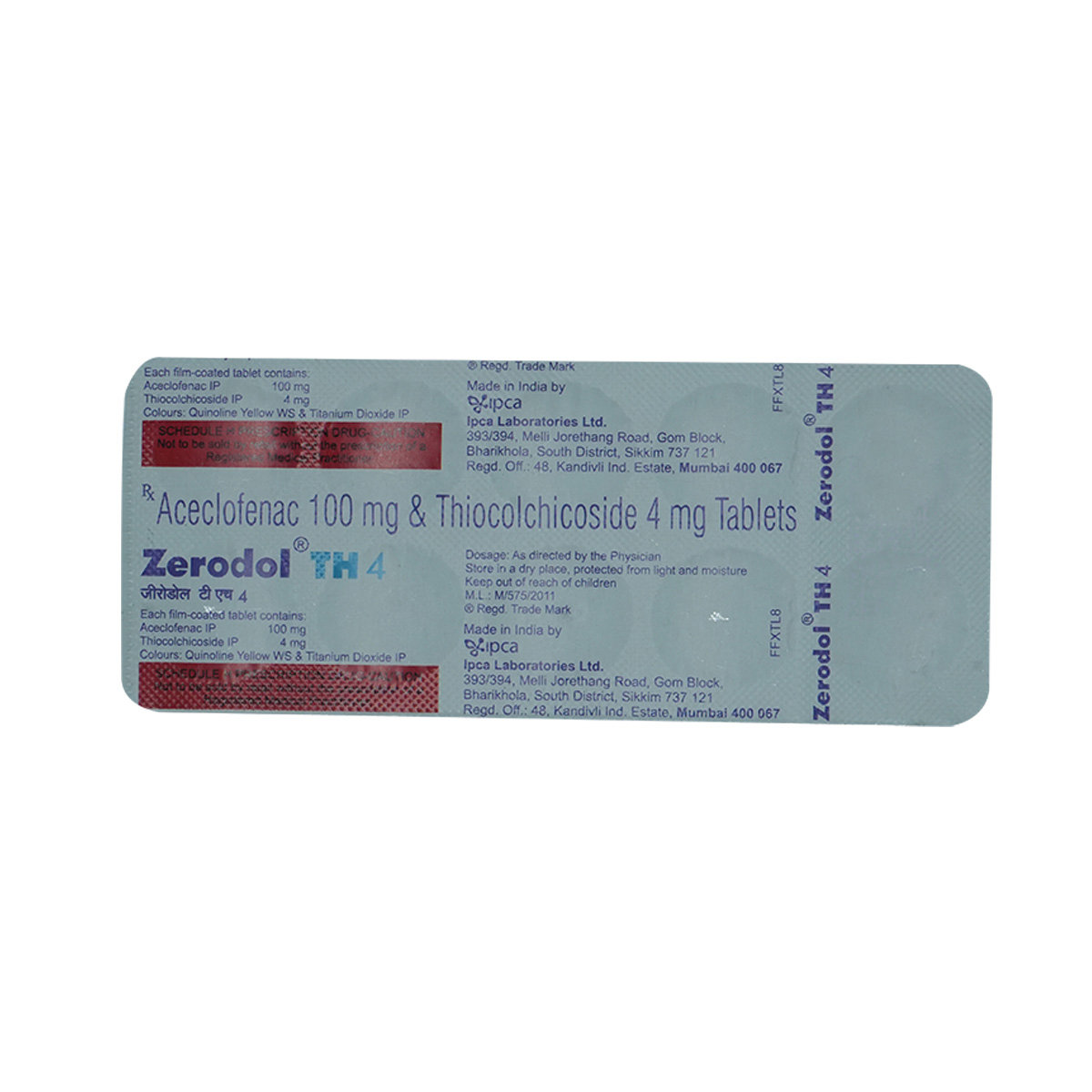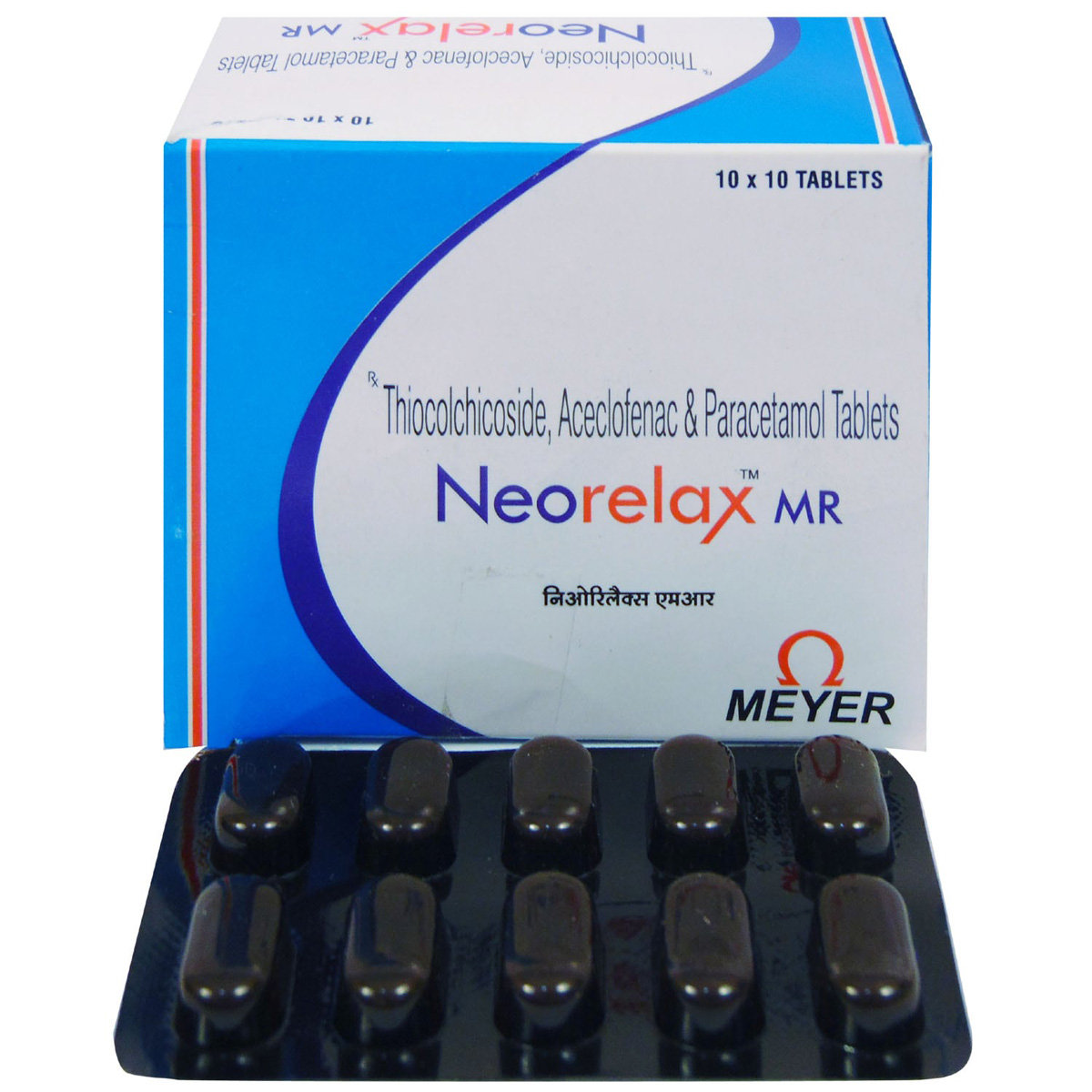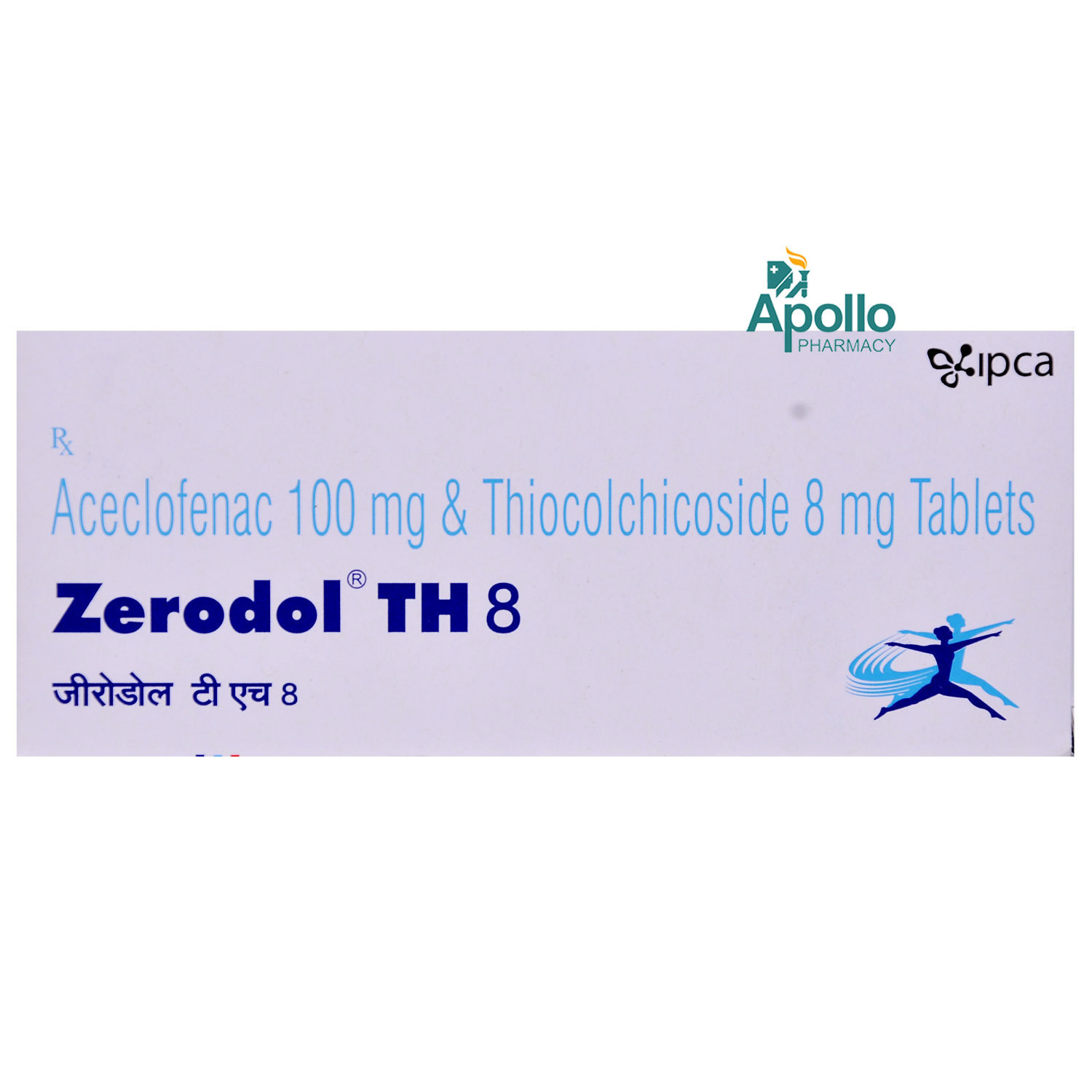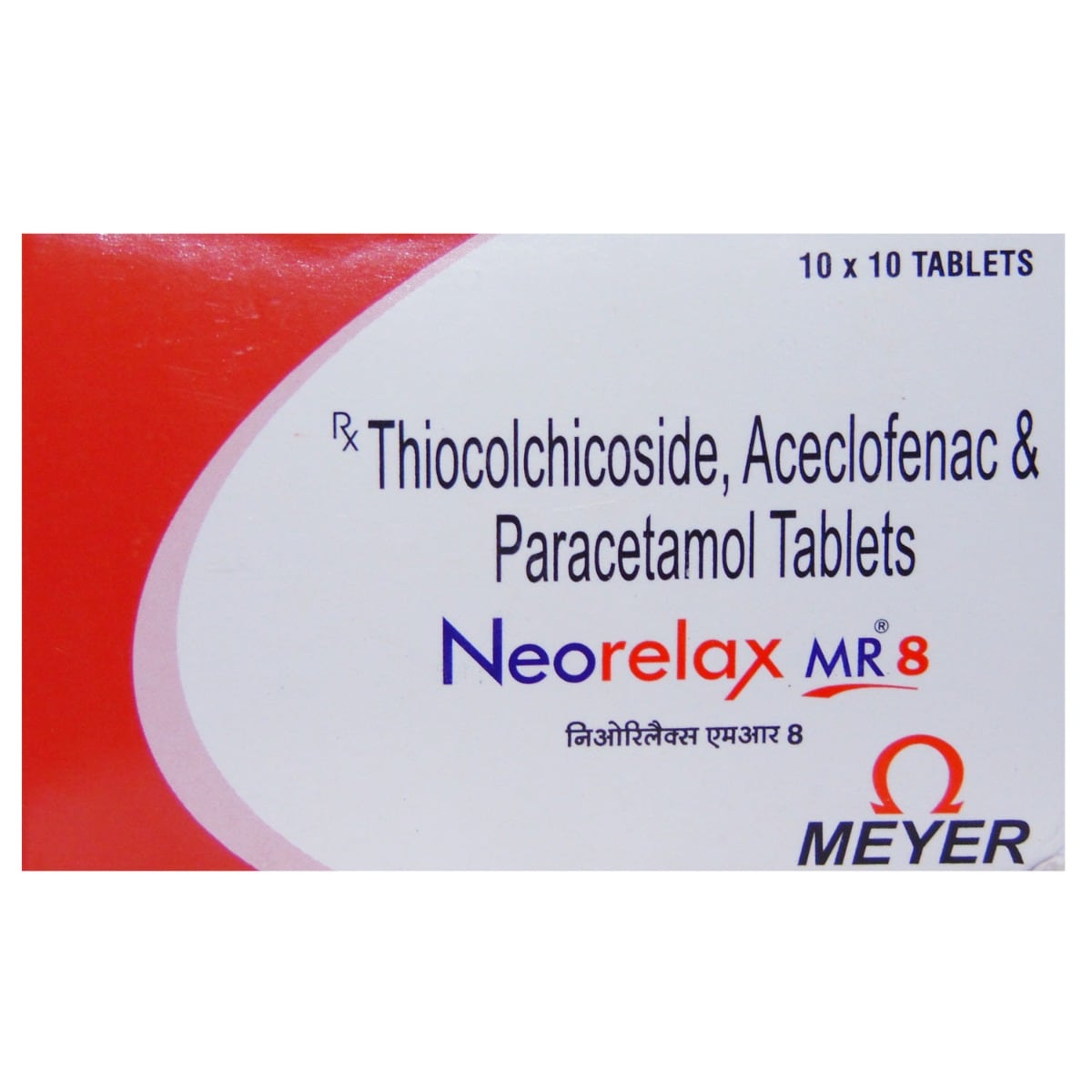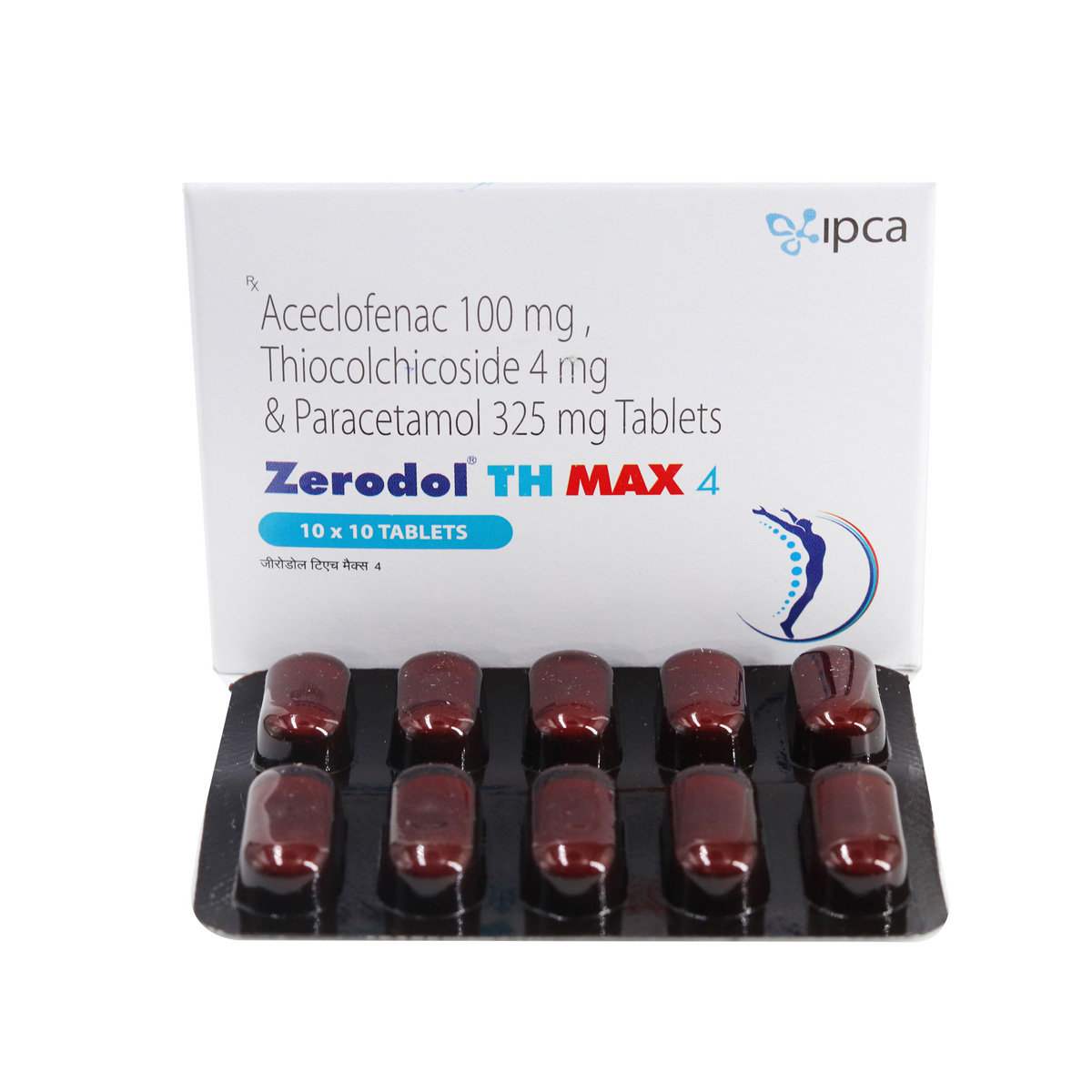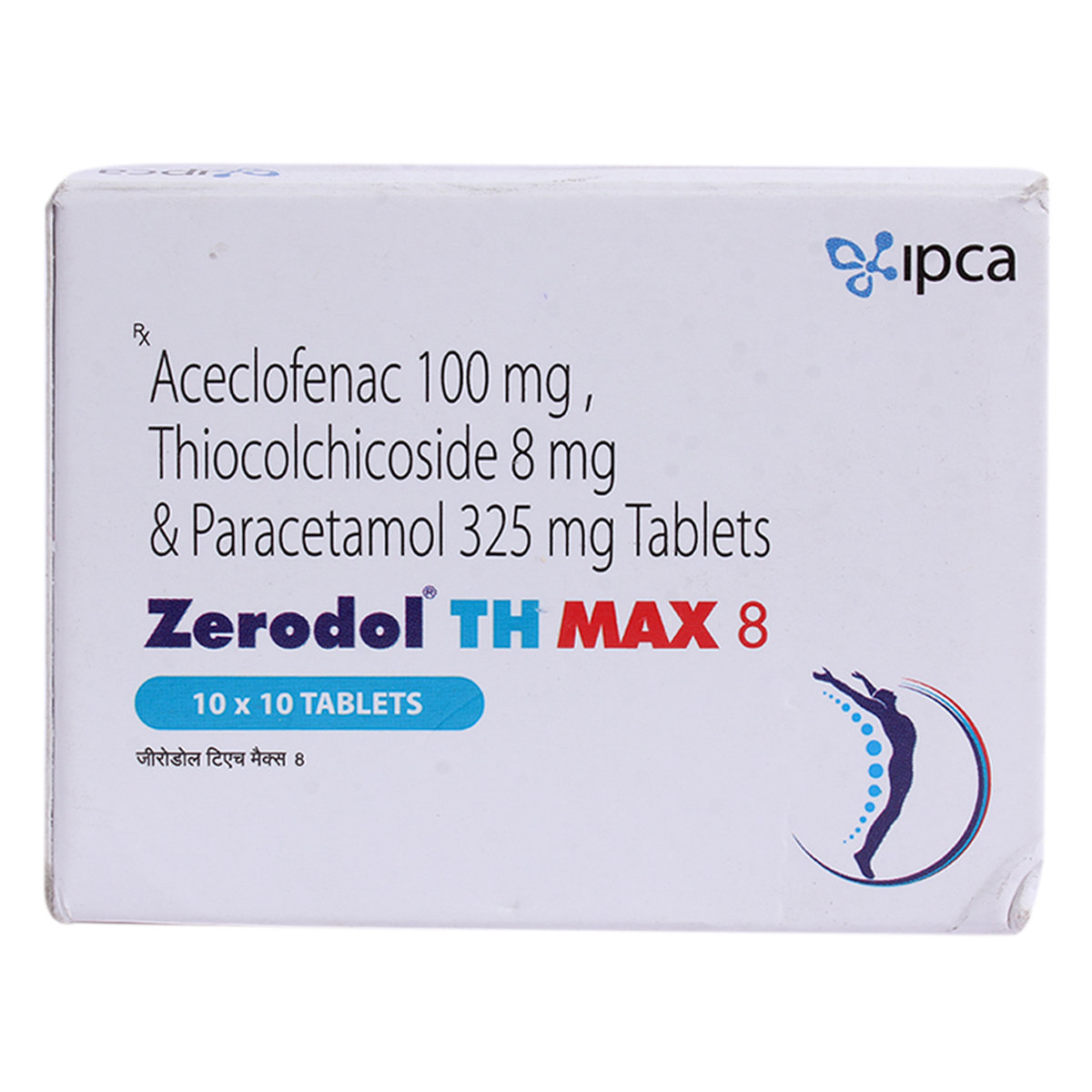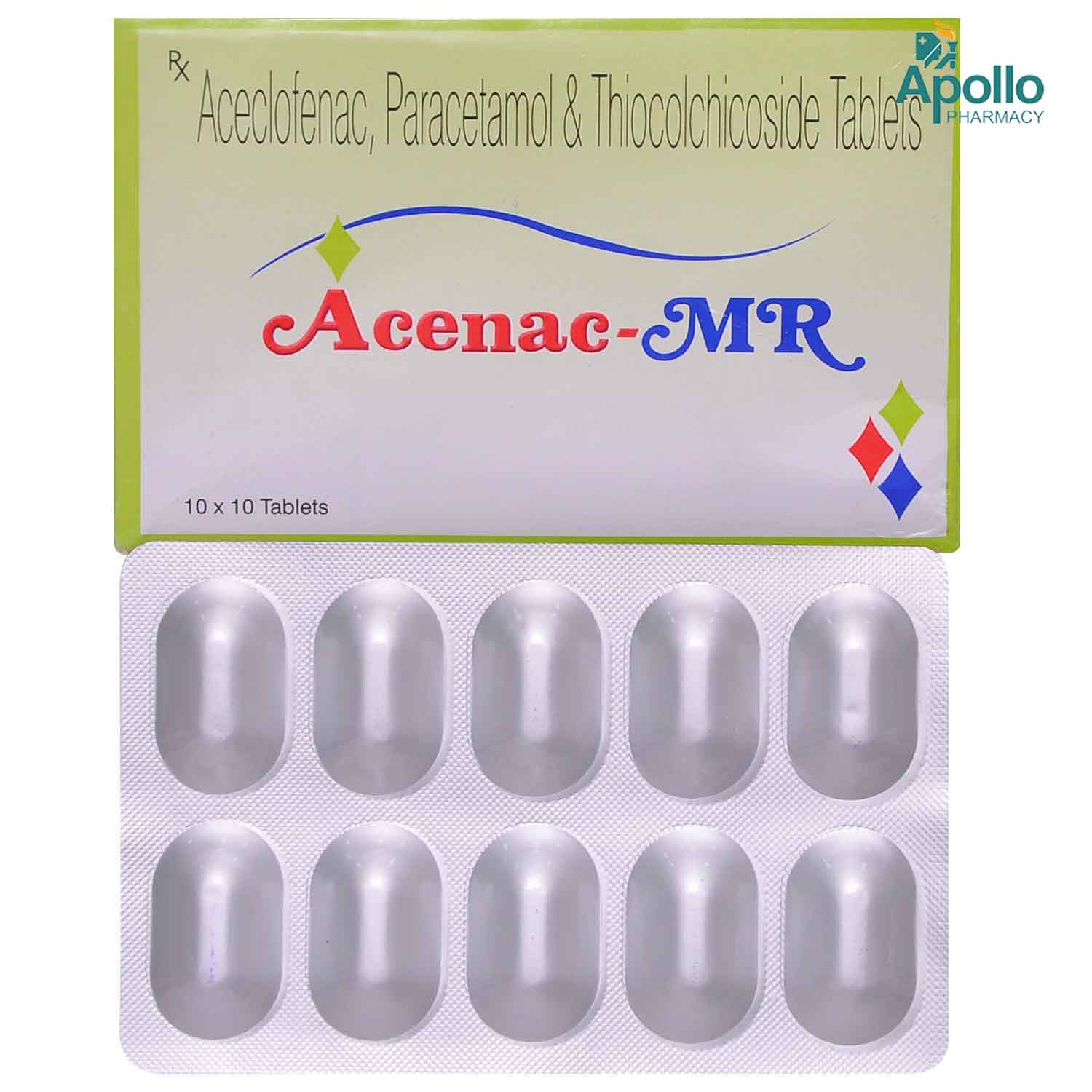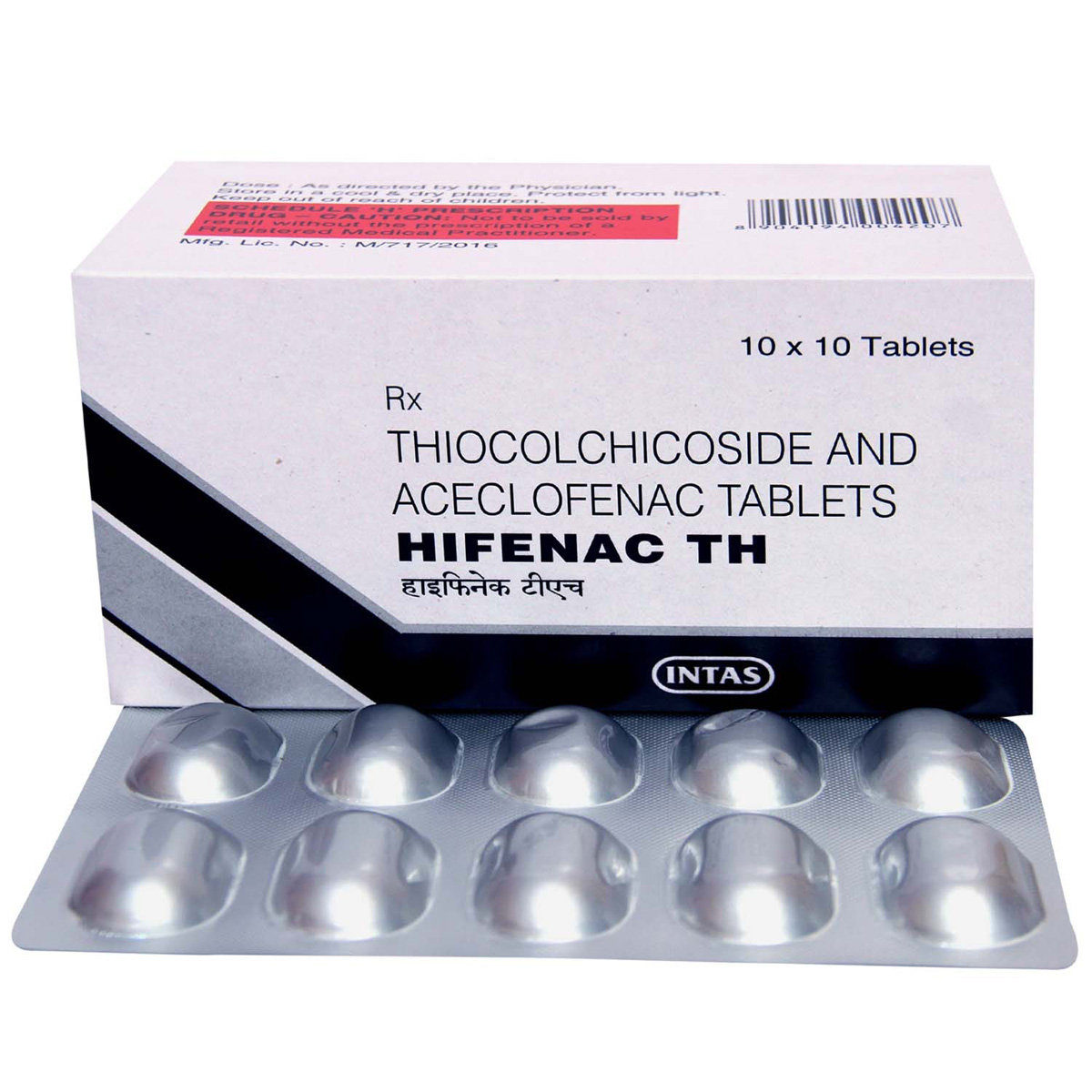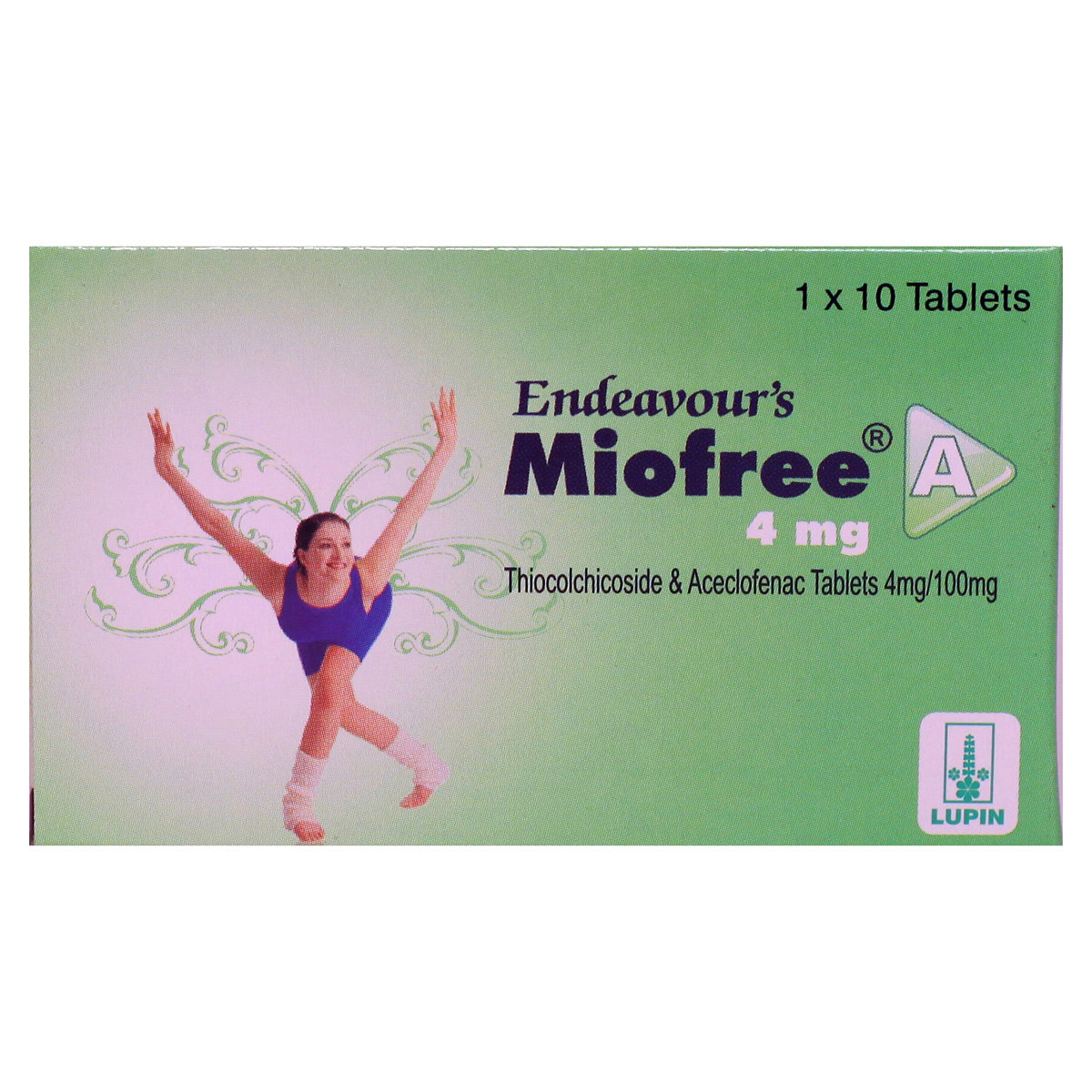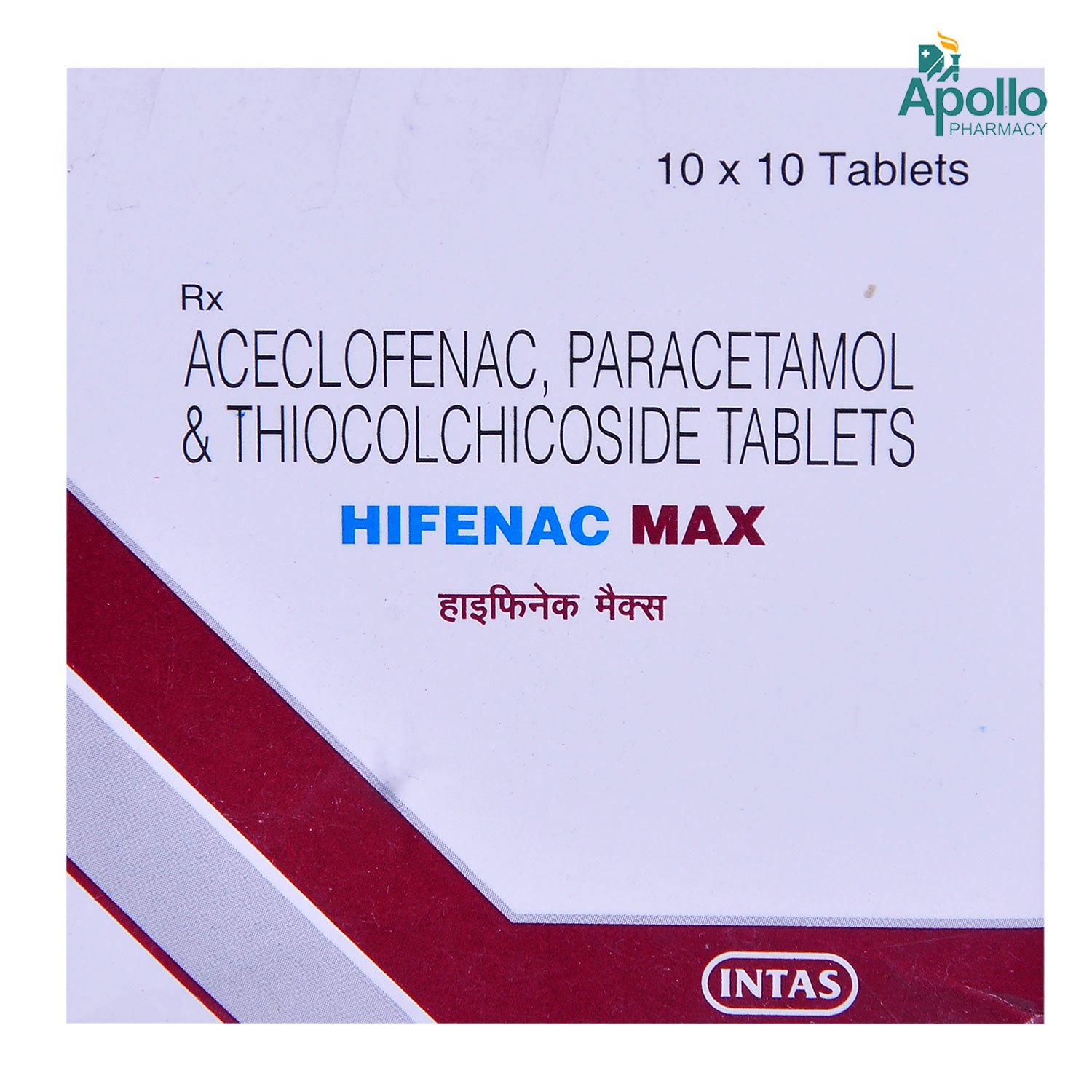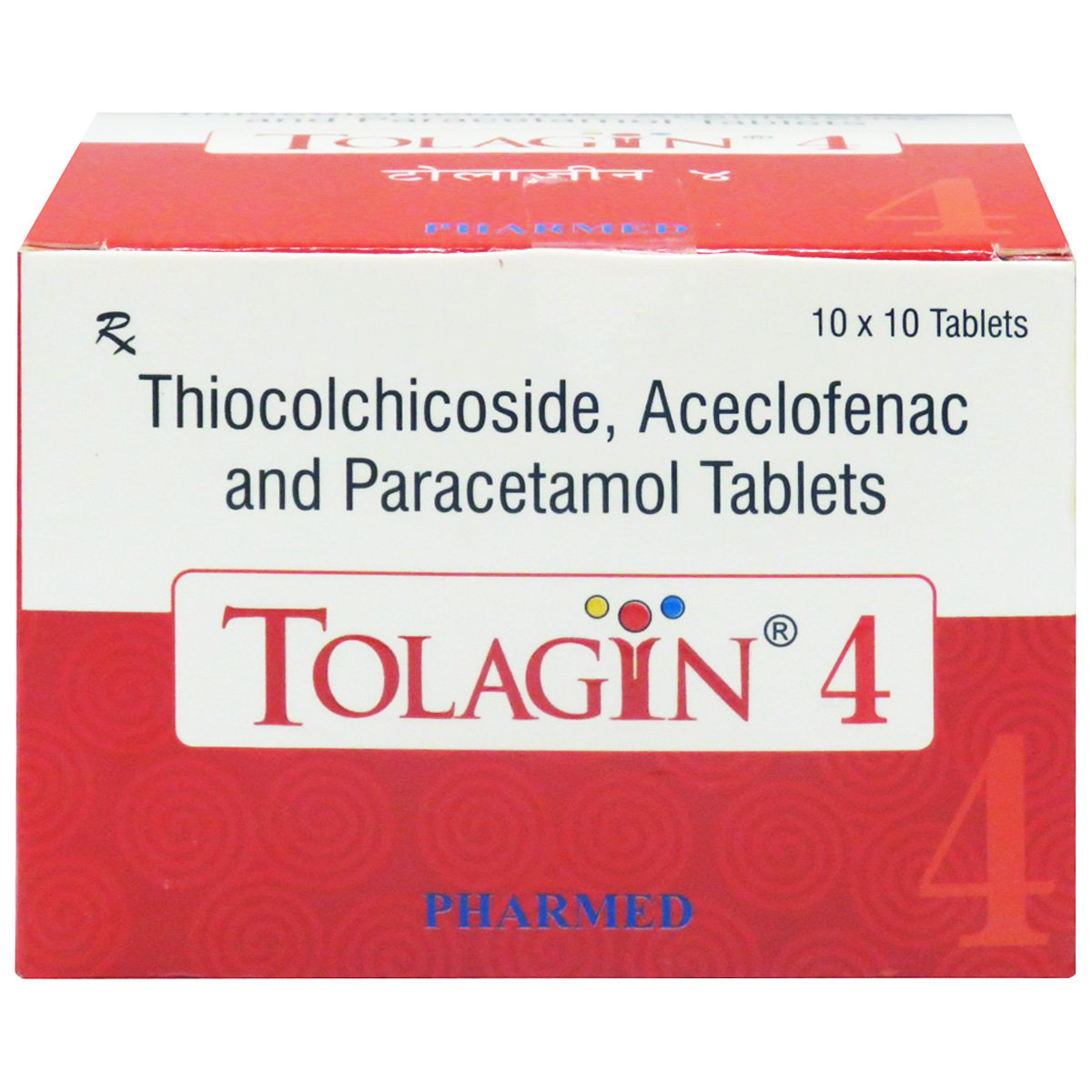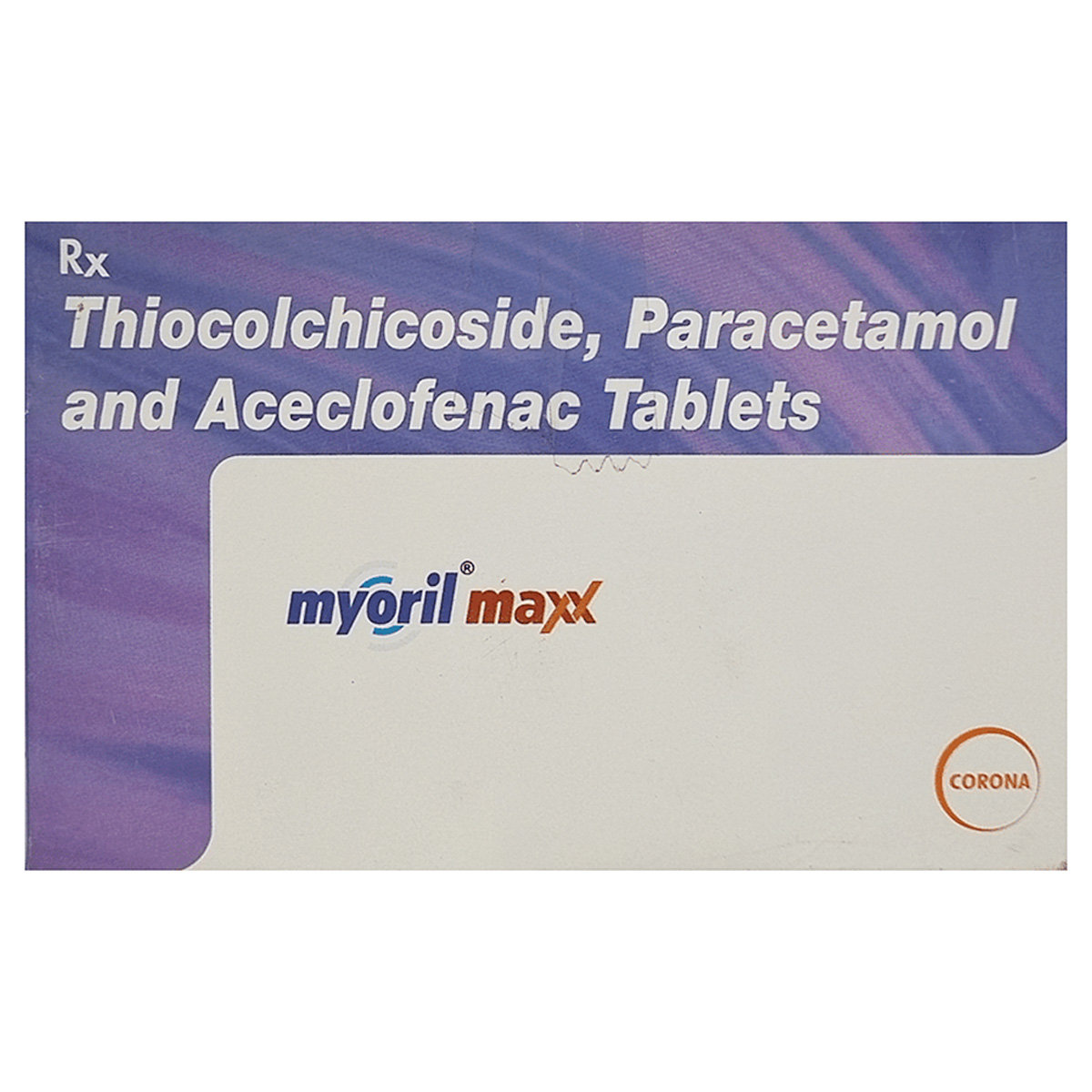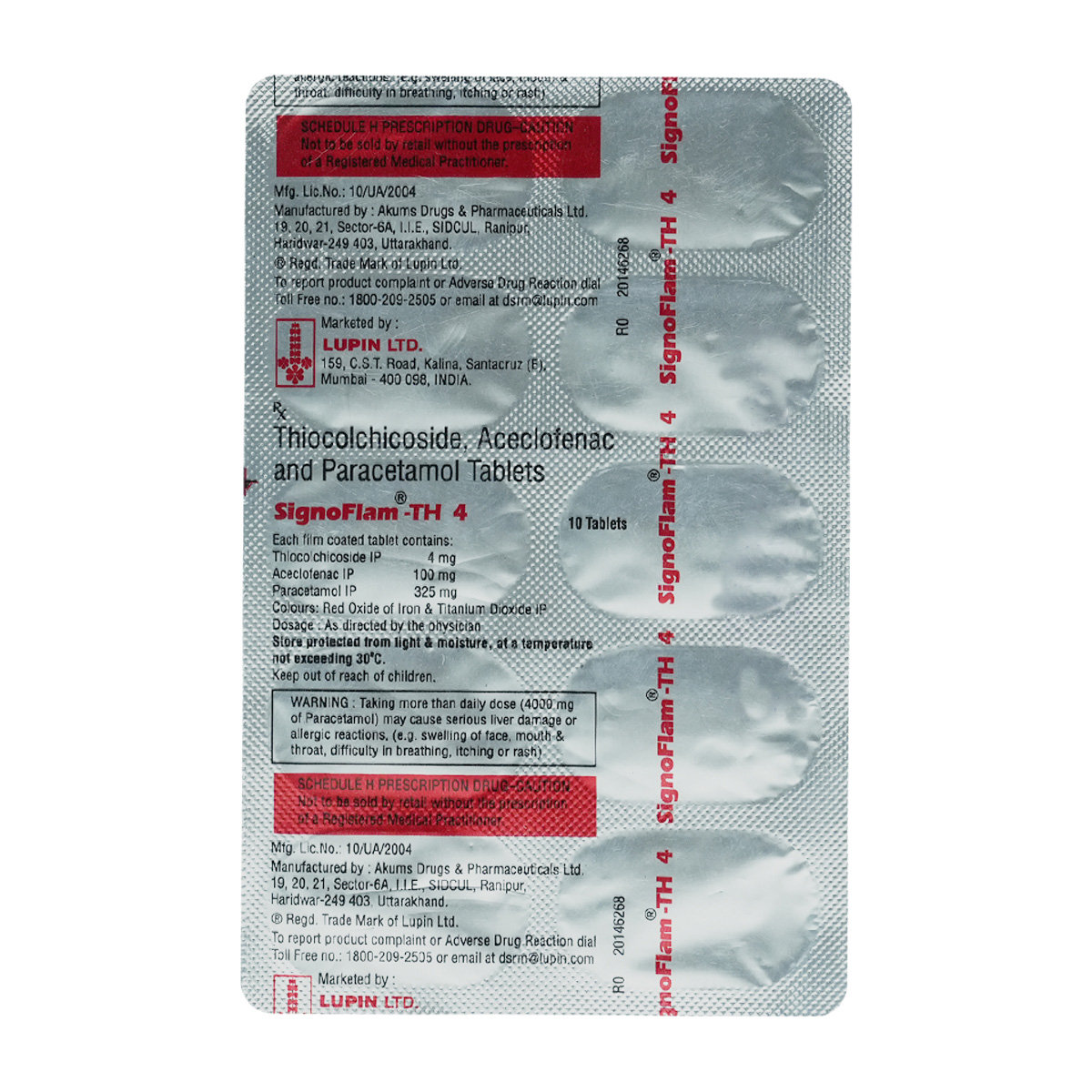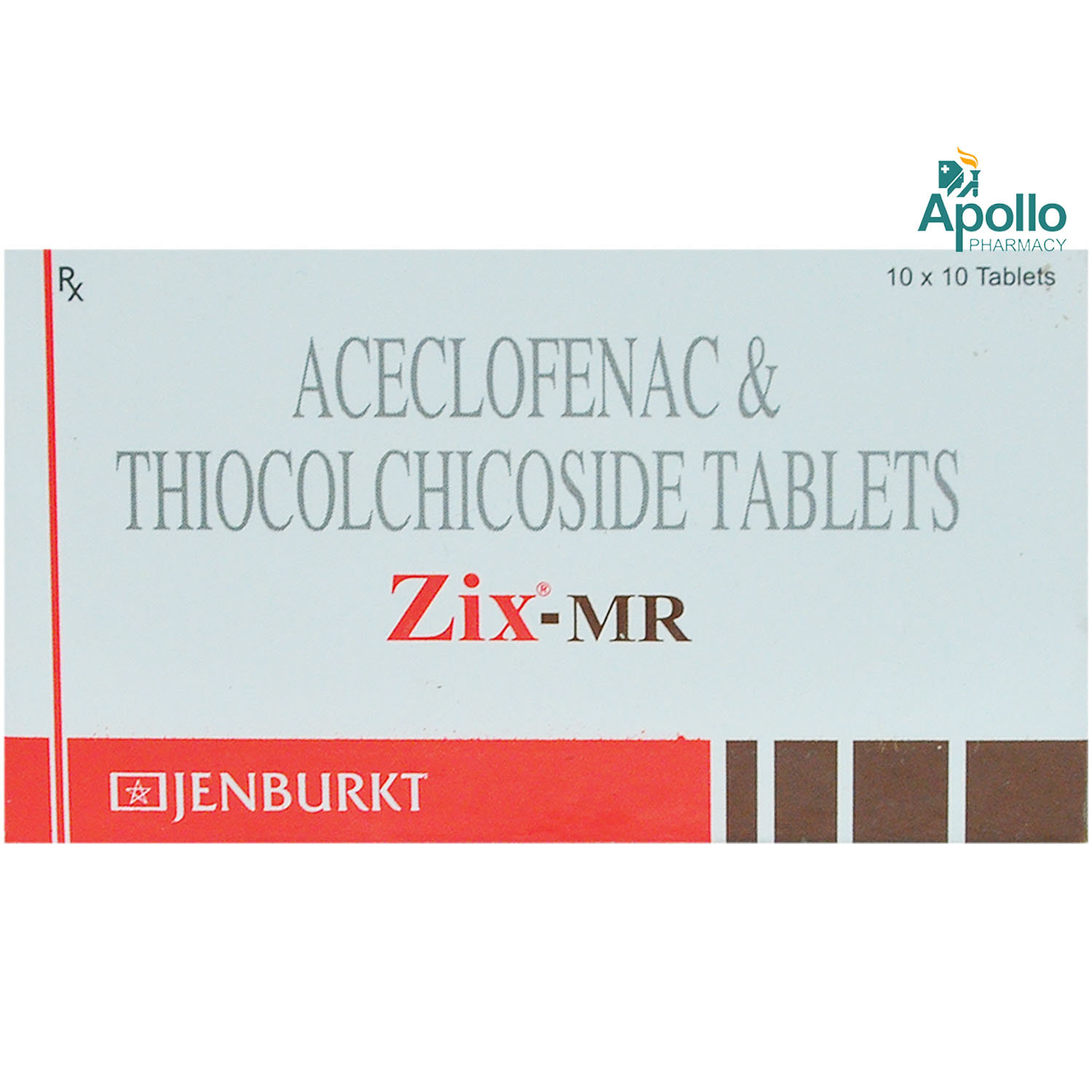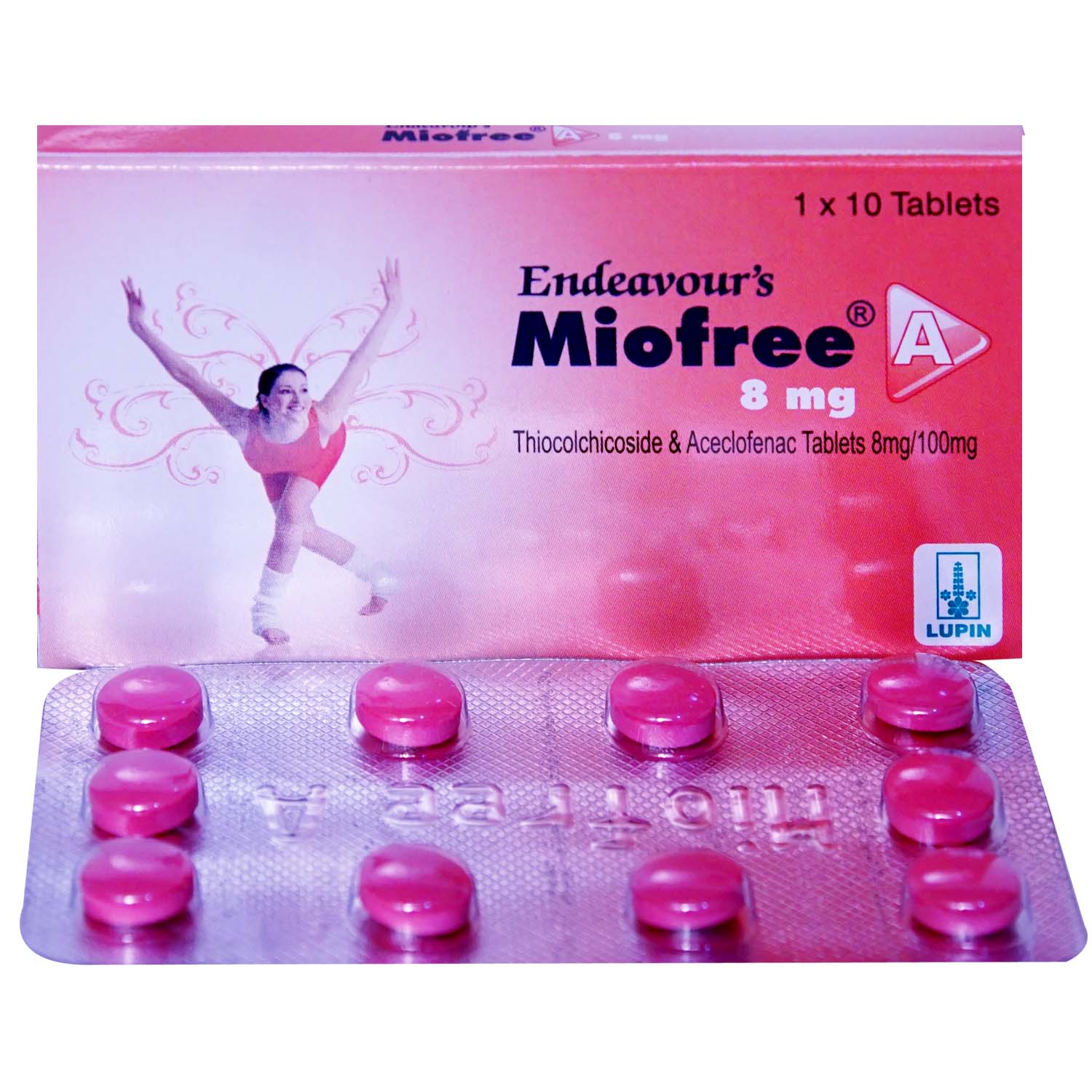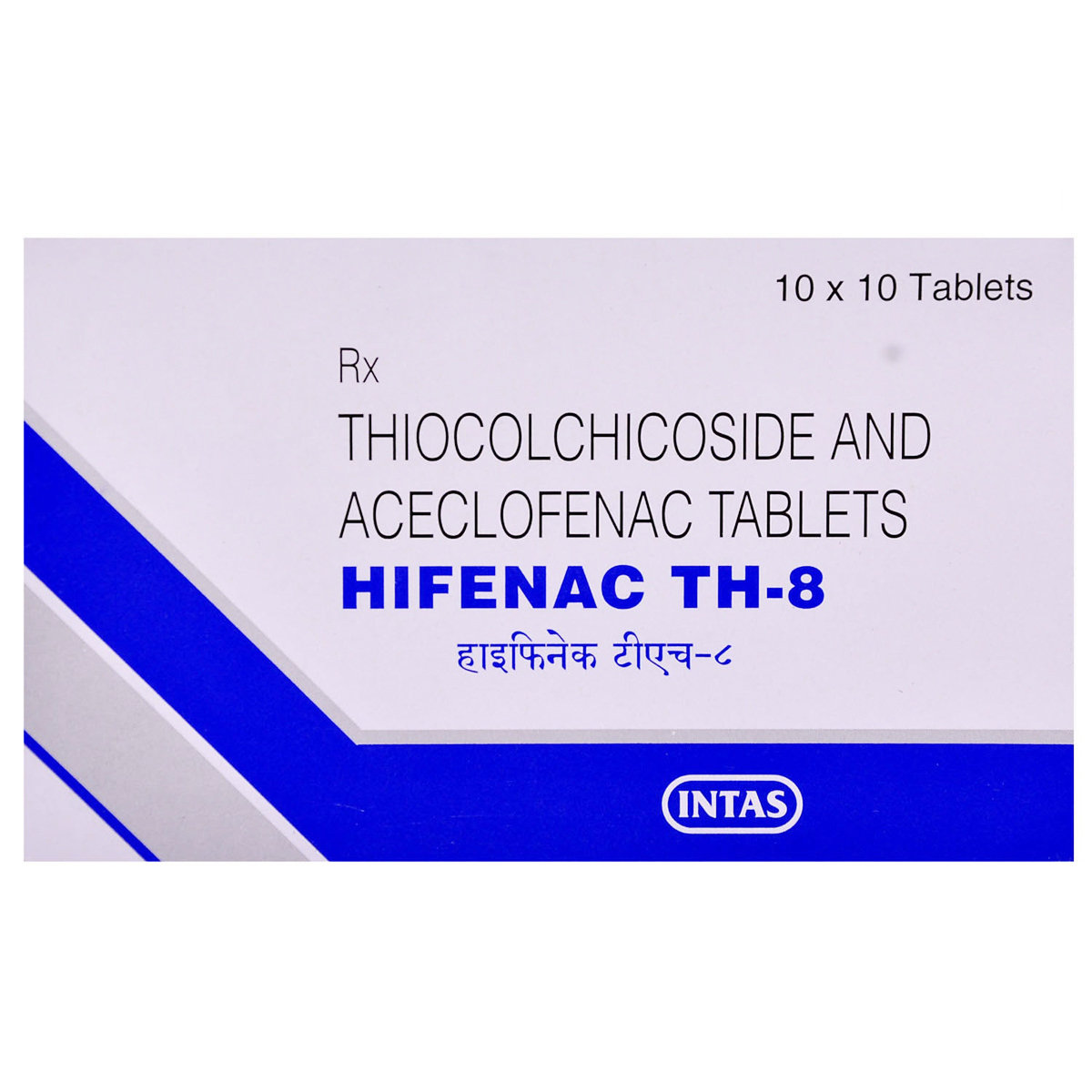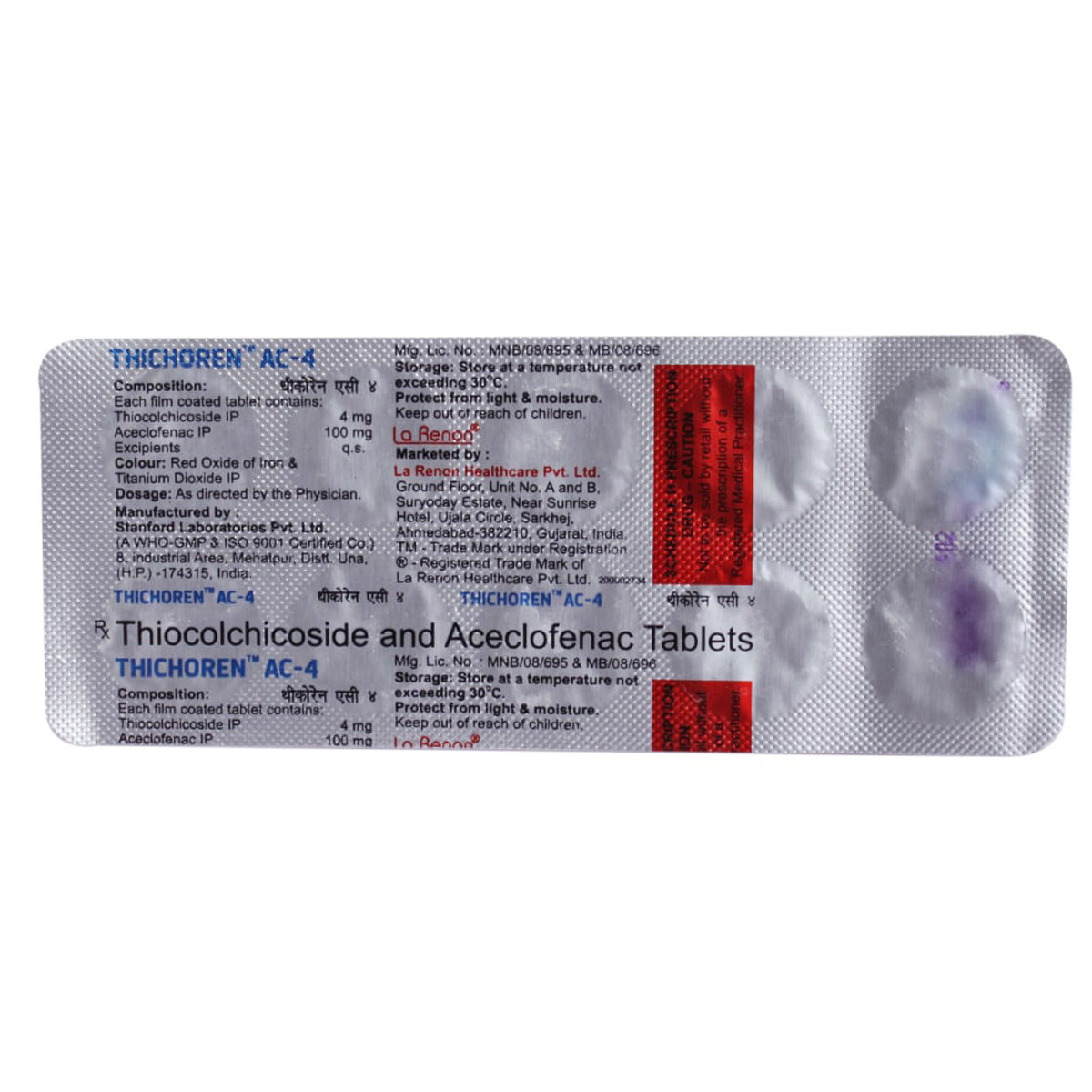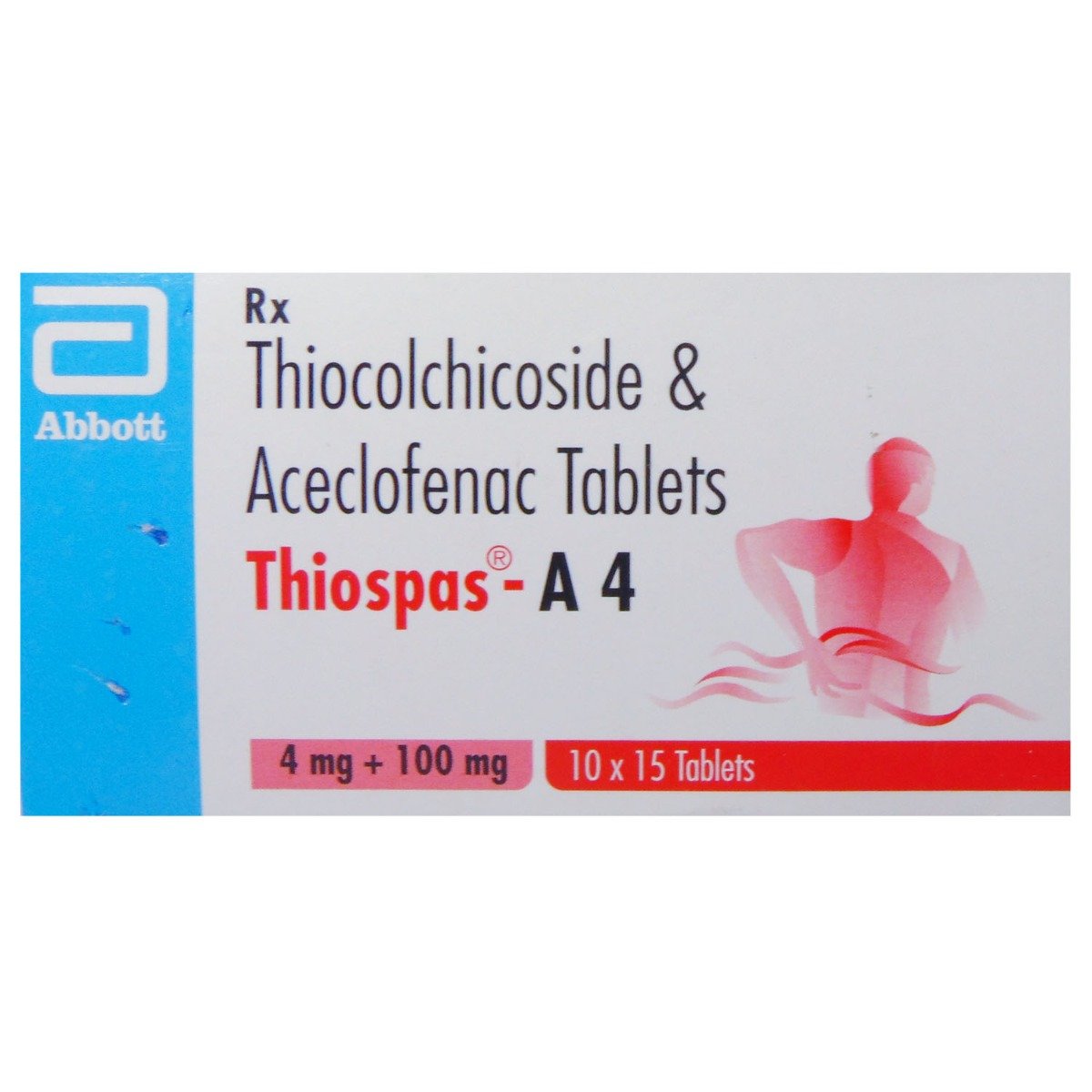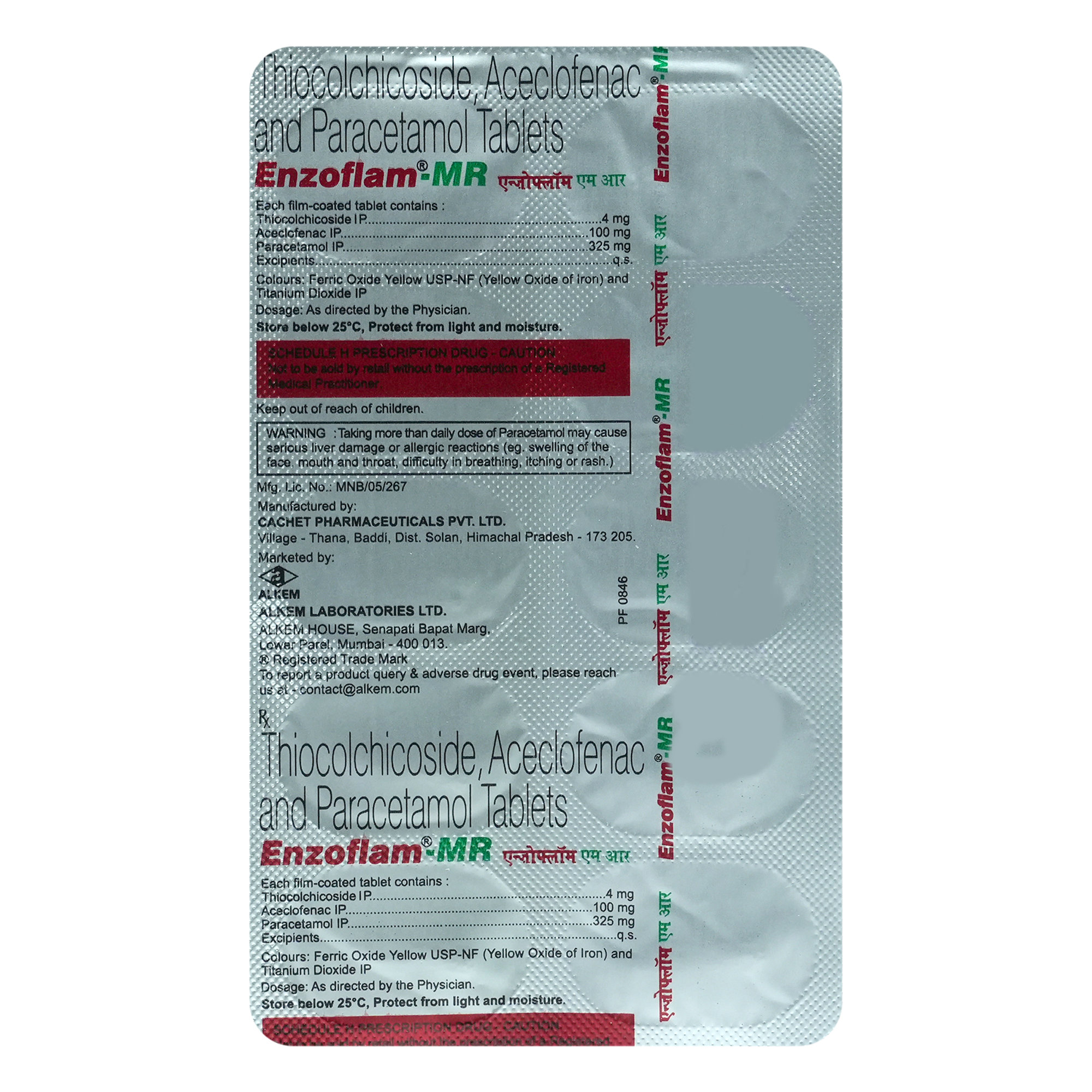Thiocolchicoside+aceclofenac
About Thiocolchicoside+aceclofenac
Aceclofenac+thiocolchicoside is used to reduce and relieve pain due to muscle spasms (painful muscular contractions) associated with degenerative vertebral disorders, vertebral static problems, dorsal pain, low back pain, and torticollis (neck muscle contractions).
Aceclofenac+thiocolchicoside is a combination of Thiocolchicoside and Aceclofenac. Thiocolchicoside works on the centres of the spinal cord and brain. This helps relieve muscle stiffness and improve muscle movements. Aceclofenac works by blocking the action of cyclo-oxygenase (COX) enzyme in the body involved in the production of certain chemical substances.
Common side effects include diarrhoea, dizziness, nausea, vomiting, stomach pain, or increased liver enzymes in the blood. Most of these side effects do not require medical attention and gradually resolve over time. However, if the side effects persist or worsen, please consult your doctor.
If you are allergic to Aceclofenac+thiocolchicoside or any other medicines, please tell your doctor. Aceclofenac+thiocolchicoside is not recommended for children below 18 years of age. Avoid taking Aceclofenac+thiocolchicoside if you are pregnant, as it may cause harm to the foetus. Aceclofenac+thiocolchicoside is excreted in breast milk. Therefore, Aceclofenac+thiocolchicoside is contraindicated in breastfeeding women as it may cause adverse effects on the baby.
Uses of Thiocolchicoside+aceclofenac
• Pain relief: Aceclofenac+thiocolchicoside acts as a muscle relaxant that helps in providing relief from pain caused by muscle spasms associated with conditions such as degenerative vertebral disorders, vertebral static problems, dorsal pain, low back pain, and torticollis (neck muscle contractions). • Inflammation reduction: Aceclofenac+thiocolchicoside helps to reduce inflammation in conditions like arthritis, improving mobility, reducing stiffness, and enhancing overall joint function.
• Muscle stiffness: Aceclofenac+thiocolchicoside relieves muscle stiffness, improving mobility and facilitating smoother muscle movements.
• Post-operative care: Aceclofenac+thiocolchicoside is often prescribed for post-operative pain management, helping patients recover more comfortably by reducing pain and inflammation after surgery.
Medicinal Benefits
- Aceclofenac+thiocolchicoside is a combination of two drugs, namely, Thiocolchicoside and Aceclofenac, used to treat pain due to muscle spasms.
- Thiocolchicoside is a muscle relaxant that works on the centres of the spinal cord and brain.
- This helps relieve muscle stiffness and improves muscle movements, thereby relieving pain due to muscle spasms.
- Aceclofenac is a non-steroidal anti-inflammatory drug (pain killer) that works by blocking the action of the cyclo-oxygenase (COX) enzyme in the body that is involved in the production of certain chemical substances, such as prostaglandins, that cause pain and swelling.
Directions for Use
- Take Aceclofenac+thiocolchicoside with food to avoid stomach upset or as advised by a doctor.
- Follow your doctor's instructions on the dosage and timing of this medication, to ensure the safety.
- Swallow the medicine as a whole with glass of water.
- Do not crush, break, or chew it.
Storage
Side Effects of Thiocolchicoside+aceclofenac
- Diarrhoea
- Dizziness
- Nausea
- Vomiting
- Stomach pain
- Increased liver enzymes in the blood
Medicines Containing this Salt
View AllDrug Warnings
- If you are allergic to Aceclofenac+thiocolchicoside or any other medicines, please tell your doctor.
- Aceclofenac+thiocolchicoside is not recommended for children below 18 years of age.
- Avoid taking Aceclofenac+thiocolchicoside if you are pregnant as it may cause harm to the fetus.
- Aceclofenac+thiocolchicoside is excreted in breast milk. Therefore, Aceclofenac+thiocolchicoside is contraindicated in breastfeeding women as it may cause adverse effects on the baby.
- Do not consume alcohol with Aceclofenac+thiocolchicoside as it may increase the risk of severe adverse effects.
- If you have asthma, diabetes, high blood pressure, stomach ulcer, high cholesterol, chickenpox, porphyria (rare inherited disorder), systemic lupus erythematosus, ulcerative colitis or Crohn’s disease, diarrhoea, bowel pain, vomiting, and weight loss), galactose intolerance, Lapp lactase deficiency, glucose-galactose malabsorption, G-6-PD deficiency, fits, muscular hypotonia, flaccid paresis, bleeding or blood clotting disorders, kidney, liver or heart diseases, inform your doctor before taking Aceclofenac+thiocolchicoside.
Drug Interactions
Drug-Drug Interaction: Aceclofenac+thiocolchicoside may have interaction with medicines used to lower high blood pressure (lisinopril, enalapril, candesartan, losartan, clonidine, moxonidine, hydralazine, methyldopa, propranolol), antibiotics (ciprofloxacin, moxifloxacin, ofloxacin, levofloxacin), water pills (furosemide, amiloride), blood thinners (heparin, warfarin, clopidogrel), anticancer drug (methotrexate), HIV drug (zidovudine), antidiabetic drugs (gliclazide, tolbutamide, glibenclamide), pain killers (ibuprofen, naproxen, aspirin, celecoxib, etoricoxib), steroids (hydrocortisone, prednisolone), medicines used for abortion (mifepristone), immunosuppressants (ciclosporin, tacrolimus), antimanic drug (lithium), heart-related medicines (digoxin), and antidepressants (fluoxetine, paroxetine, sertraline, fluvoxamine, citalopram, escitalopram).
Drug- Food Interaction: Avoid the intake of alcohol with Aceclofenac+thiocolchicoside as it may increase the risk of severe adverse effects.
Drug-Disease Interaction: If you have asthma, diabetes, high blood pressure, stomach ulcer, high cholesterol, chickenpox, porphyria (rare inherited disorder), systemic lupus erythematosus (an autoimmune disease), ulcerative colitis or Crohn’s disease (conditions causing swelling of the bowel, diarrhoea, bowel pain, vomiting and weight loss), galactose intolerance, Lapp lactase deficiency, glucose-galactose malabsorption, G-6-PD deficiency (a hereditary condition resulting in low red blood cell counts), fits, muscular hypotonia (decreased muscle tone), flaccid paresis (loose and floppy limbs), bleeding or blood clotting disorders, kidney, liver or heart diseases, inform your doctor before taking Aceclofenac+thiocolchicoside.
Drug-Drug Interactions Checker List:
Safety Advice

Alcohol
unsafeYou are recommended to avoid alcohol consumption with Aceclofenac+thiocolchicoside as it may increase the risk of severe adverse effects.

Pregnancy
unsafeAceclofenac+thiocolchicoside is not recommended for pregnant women, especially in the last 3 months of pregnancy, as it may cause harm to the foetus. However, please consult your doctor if you are pregnant.

Breast Feeding
unsafeAvoid breastfeeding while taking Aceclofenac+thiocolchicoside as it may be excreted in breast milk and cause adverse effects in the baby. However, please consult a doctor if you are breastfeeding.

Driving
cautionAceclofenac+thiocolchicoside may cause drowsiness, tiredness, dizziness or vision problems in some people. Therefore, avoid driving if you feel any of these symptoms after taking Aceclofenac+thiocolchicoside.

Liver
cautionTake Aceclofenac+thiocolchicoside with caution, especially if you have a history of liver disease. The dose may be adjusted by your doctor as required. Avoid taking Aceclofenac+thiocolchicoside if you have severe liver failure.

Kidney
cautionTake Aceclofenac+thiocolchicoside with caution, especially if you have a history of Kidney diseases/conditions. The dose may be adjusted by your doctor as required. Avoid taking Aceclofenac+thiocolchicoside if you have severe kidney disease.

Children
unsafeAceclofenac+thiocolchicoside is not recommended for children as the safety and effectiveness were not established.
Habit Forming
Diet & Lifestyle Advise
- Regular exercise helps in muscle stretching so that they are less likely to spasm, tear and sprain. Mild exercises such as jogging and walking are helpful for muscle stretching.
- Massages can also be helpful.
- Avoid freezing and hot temperatures.
- Avoid wearing tight-fitting clothes, instead, wear loose garments.
- Rest well, and get plenty of sleep.
- To avoid developing pressure sores, change your position at least every two hours.
- Hot or cold therapy can help treat muscle spasms. Apply an ice pack or hot-pack on the muscle for 15-20minutes.
- Stay hydrated, drink plenty of water.
Special Advise
Regular tests are recommended to monitor liver functioning and liver enzymes while taking Aceclofenac+thiocolchicoside.
Patients Concern
Disease/Condition Glossary
Pain: It is a symptom triggered by the nervous system, causing uncomfortable sensations in the body. Muscle spasm is the sudden, involuntary contraction of a muscle, which can be painful and uncomfortable. When the nerve impulses that control the muscle movements are damaged or interrupted, it could lead to muscle spasms. Symptoms include muscle tightness, joint stiffness, unusual posture, difficulty in moving, and pain in affected muscles and joints. Fatigue (weakness), stress, extreme heat or cold, infection, and tight clothing can trigger muscle spasms. Muscle relaxants and exercise can treat muscle spasms. Muscle relaxants sedate the muscle and help in inhibiting painful contractions. Whereas, exercise helps in muscle stretching to be less likely to spasm, tear and sprain.
FAQs
Aceclofenac+thiocolchicoside is used to reduce and relieve pain due to muscle spasms (painful muscular contractions) associated with degenerative vertebral disorders, vertebral static problems, dorsal pain, low back pain, and torticollis (neck muscle contractions).
Aceclofenac+thiocolchicoside contains Thiocolchicoside and Aceclofenac. Thiocolchicoside is a muscle relaxant that works on the centres of the spinal cord and brain. This helps relieve muscle stiffness and improves muscle movements, thereby relieving pain due to muscle spasms. Aceclofenac is a non-steroidal anti-inflammatory drug (pain killer) that works by blocking the action of the cyclo-oxygenase (COX) enzyme in the body, which is involved in producing certain chemical substances, such as prostaglandins, that cause pain and swelling.
Aceclofenac+thiocolchicoside may affect sperm cells and thereby cause problems with male fertility. Therefore, please consult your doctor before taking Aceclofenac+thiocolchicoside if you are planning to become a father.
Aceclofenac+thiocolchicoside may cause diarrhoea as a side effect. It is not necessary for everyone taking Aceclofenac+thiocolchicoside to experience this side effect. However, if the condition persists or worsens, please consult a doctor.
You are not recommended to take Aceclofenac+thiocolchicoside with warfarin as co-administration of these two medicines may increase the bleeding risk more easily. However, if you are supposed to use these medicines together, you are advised to contact your doctor so that the dose may be adjusted appropriately for safe use.
Aceclofenac+thiocolchicoside may trigger fits, especially in patients at risk or those already suffering from them. Therefore, please inform your doctor if you have a history of fits before taking Aceclofenac+thiocolchicoside.
You are recommended to use Aceclofenac+thiocolchicoside for as long as your doctor has prescribed it. However, if the symptoms persist even after using Aceclofenac+thiocolchicoside for 7 days, stop taking Aceclofenac+thiocolchicoside and consult a doctor.
Avoid taking Aceclofenac+thiocolchicoside if you are allergic to it. Inform your doctor if you have a history of stomach ulcers, heart disease, high blood pressure, bleeding disorders, liver or kidney problems. Consult your doctor before using Aceclofenac+thiocolchicoside if you are pregnant or breastfeeding and it best to avoid alcohol while taking Aceclofenac+thiocolchicoside as it can increase the risk of stomach ulcers and bleeding.
No, Aceclofenac+thiocolchicoside is not addictive. However, it's important to use it only as prescribed by your doctor.
Aceclofenac+thiocolchicoside is generally used for short-term and can be stopped when the pain is relieved. However, it should be used for the duration as advised by your doctor.
Yes, some people may experience dizziness (feeling weak, faint, unsteady, or lightheaded) after taking Aceclofenac+thiocolchicoside. It is best to take a short break and restart once you feel better if you are experiencing light-headedness or dizziness. However, consult your doctor if your condition persists or worsens.
The use of Aceclofenac+thiocolchicoside may be harmful to patients with known allergies to painkillers or components of this medicine. It should also be avoided in individuals with a history of stomach ulcers, heart failure, high blood pressure, liver disease, and kidney problems. Therefore, if you have any medical conditions, inform your doctor before taking Aceclofenac+thiocolchicoside.
Yes, Aceclofenac+thiocolchicoside can be taken with Vitamin B-complex. Vitamin B-complex helps to treat vitamin deficiency, which may be the cause of your symptoms. However, please consult your doctor before taking Aceclofenac+thiocolchicoside with other medicines or supplements.
Long-term use of Aceclofenac+thiocolchicoside can cause kidney damage due to the reduction in prostaglandins, which normally protect the kidneys. It's important to monitor kidney function regularly and consult your doctor if you have any concerns or pre-existing kidney conditions.
No, taking more than the recommended dose will not improve its effectiveness but may lead to increased side effects. Consult your doctor if you think you have taken more doses of Aceclofenac+thiocolchicoside or experience worsening symptoms while taking Aceclofenac+thiocolchicoside.
Take Aceclofenac+thiocolchicoside in the dose and duration as advised by your doctor. Swallow it as a whole. Do not chew, crush or break it. Aceclofenac+thiocolchicoside is to be taken with food.
You are recommended to consult your doctor before taking other medicines with Aceclofenac+thiocolchicoside to avoid potential drug interactions. Some medications that may interact with Aceclofenac+thiocolchicoside include anti-hypertensives, antidiabetic medications, and antidepressants. These interactions can affect the effectiveness of the medications or increase the risk of side effects. Therefore, it is important to inform your doctor about all the medications you are taking, including over-the-counter drugs and supplements, to ensure safe and effective treatment.
If you suspect an overdose of Aceclofenac+thiocolchicoside, it is crucial to seek immediate medical attention. Symptoms of an overdose may include nausea, seizures (fits) and drowsiness. If you experience any of these symptoms, consult your doctor.
The side effects of Aceclofenac+thiocolchicoside are diarrhoea, dizziness, nausea, vomiting, stomach pain and increased liver enzymes in the blood. If these persist or worsen, consult your doctor.

